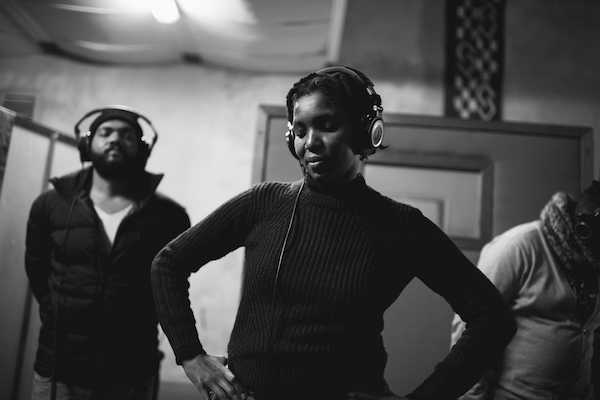Jan 13, 2026 2:09 PM
More Trump-Kennedy Center Cancellations
The fallout from the renaming of the John F. Kennedy Center for the Performing Arts to include President Donald…

Thandi Ntuli sought for Indaba Is to reflect cosmopolitan elements that pulsate through the scene in South Africa.
(Photo: Tseliso Monaheng)Indaba Is, a compilation recorded during June and July of 2020, ranks as a compelling document of the electrifying scene that emanates from Johannesburg, South Africa.
Pianist Thandi Ntuli and vocalist Siyabonga Mthembu, the album’s curators, both lament that the verve of South African jazz sometimes gets lost in translation on foreign stages.
Mthembu, speaking with DownBeat from South Africa in January, said that some unfamiliar audiences occasionally exclaim, “Oh, my God, you guys are so crazy. You’re so out there.” But in context, their idiosyncratic flavor “has a meaning. It has a purpose.”
The compilation is as much a declaration of that context as it is an affirmation of their unique perspective, according to Ntuli. She hopes Indaba Is serves as “an affirmation of ourselves, as well, because part of our own personal liberation has also included affirming the worthiness of the African perspective.”
Mthembu performs as a member of Shabaka and the Ancestors. The band, sans namesake reedist Shabaka Hutchings, contributed “Prelude To Writing Together” to Indaba Is. But he traces the impetus of the album back to a gig the ensemble played at New York’s Winter Jazzfest in 2017.
“The morning afterwards, I got a long message from a journalist who said, ‘I had watched Hugh Masekela 30 years ago in the same room,’” Mthembu said. “I remembered what a global force South Africa was in the jazz space and in the Black music space.”
Mthembu also began to recognize a continuity between the music he and his peers were creating, and the music that his parents listened to while he was growing up.
Not long afterward, while at dinner following a London gig, Mthembu heard “Abusey Junction” by Kokoroko from We Out Here, a 2018 Brownswood compilation built around London’s burgeoning jazz scene. He’d been “in and around that London scene,” taking in its energy. But the vocalist was well aware that there were other idiosyncratic enclaves developing across the world.
Mthembu thought that a similar recording could be centered on Johannesburg’s scene. Ntuli was then brought in as co-curator.
She framed the initial challenge: “How do we tell such a large story with eight tracks on an album?”
The pair ultimately concluded that the recording should be “less about individual artists and more about the backstory of where we all come from and the scene at large,” Ntuli said.
That scene encompasses a spate of acts, including pianist Bokani Dyer and avant-garde band The Wretched. To Ntuli, it was important that the album reflect the cosmopolitan elements that pulsate through the scene.
“The nature of Johannesburg is that historically, it’s a migrant city, built around the gold rush booming [in South Africa],” Ntuli said. “And those influences have been in our music for years. Our generation is continuing that legacy.”
It was crucial to both Mthembu and Ntuli that the recording declare the South African perspective, ideologically and aesthetically. “The Bantu cosmology exists, we have stories of our beginnings,” Mthembu explained. “Even the title Indaba Is is pointing to Indaba, My Children, which is Sanusi Credo Mutwa’s book about the beginning of the Bantu people. We’re affirming it.”
In indigenous South African culture, music isn’t a commodity to be purchased, Mthembu said: “The arts [are] really central to our healing. They’re not just something to be put on SoundCloud to stream for life immemorial.”
The vocalist is particularly mindful to recognize his elders, who he considers “important to our building blocks in South African music.” He name-checked Madala Kunene, “the father of Zulu guitar,” and Busi Mhlongo, “the mother of guitar,” whose 2009 album, Amakholwa=Believers, “is probably the biggest healing balm to this time,” he said.
Ntuli concluded that she sees Indaba Is as a turning point for her generation, an assertion “of ancient, traditional knowledge systems that are based [in South Africa] that we have always maybe sensed, but were not allowed to be a part of our culture.” DB

Belá Fleck during an interview with Fredrika Whitfield on CNN.
Jan 13, 2026 2:09 PM
The fallout from the renaming of the John F. Kennedy Center for the Performing Arts to include President Donald…

Peplowski first came to prominence in legacy swing bands, including the final iteration of the Benny Goodman Orchestra, before beginning a solo career in the late 1980s.
Feb 3, 2026 12:10 AM
Ken Peplowski, a clarinetist and tenor saxophonist who straddled the worlds of traditional and modern jazz, died Feb. 2…

The success of Oregon’s first album, 1971’s Music Of Another Present Era, allowed Towner to establish a solo career.
Jan 19, 2026 5:02 PM
Ralph Towner, a guitarist and composer who blended multiple genres, including jazz — and throughout them all remained…

Rico’s Anti-Microbial Instrument Swab
Jan 19, 2026 2:48 PM
With this year’s NAMM Show right around the corner, we can look forward to plenty of new and innovative instruments…

Richie Beirach was particularly renowned for his approach to chromatic harmony, which he used to improvise reharmonizations of originals and standards.
Jan 27, 2026 11:19 AM
Richie Beirach, a pianist and composer who channeled a knowledge of modern classical music into his jazz practice,…